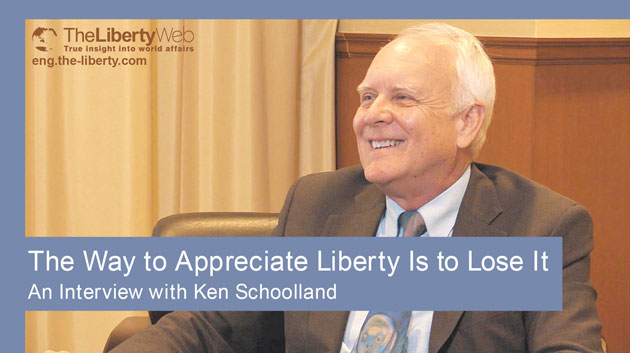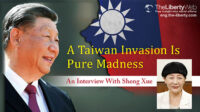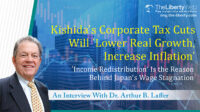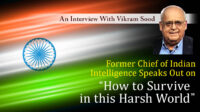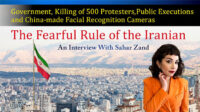The Way to Appreciate Liberty Is to Lose It
An Interview with Ken Schoolland
Libertarians Run Their Own Lives
Q: What made you interested in Libertarianism?
A: My path to liberty came from these philosophers, I’d say, Milton Friedman, Ayn Rand, Murray Rothbard were probably the strongest early influences to take me on this path. In part, well, actually my mother. When I was very young I asked my mother what are the different points of view in politics? She said, “Well, either the government runs your life or you run your life”. And I liked that. It gave me the bearing, the focus for all of my thinking after that. Either I run my life or somebody runs it. And that’s when my philosophy started forming. You own your life. You’re responsible for it; therefore you make the decisions. If somebody tries to take it from you, they’re stealing from you.
The Right of Individuals to Make Their Own Choices
I make a point that most people think it is wrong to lie, to steal and to kill. It’s wrong for you to steal, lie or kill. But throughout history, they’ve always given a kind of purification ritual. For many years it was called the “Divine Right of Kings”. It authorizes some people to lie, to steal to kill. But more recently it’s been replaced with the “Divine Right of Majorities”. They believe that if a large number of people vote for a leader, he can lie, he can steal, he can kill. But I believe it is always wrong. And those who believe in force, whether by divine right of kings, or divine right of majorities, they’re over here. I don’t believe in that. I believe in the right of individuals to make their own choices. This is a voluntary society without force.
Advocating Free Markets
Q: I’d like to ask you about a recent trend throughout the world. Picketty is becoming very popular, and Sanders is very popular among young Americans. How do you see this trend?
A: Well, I don’t see it lasting very long. I hope not, you know, because they’re not friends of free markets. I’m very much an advocate of free markets. Of course, any trend can go in any direction, but I’m hoping and working for a freer world with more appreciation for liberty, that’s precisely what your organization is, and that’s why I like your university so very much. And it is very rare that people have an appreciation for freedom.
So many politicians, especially in America today, they’re all taking about ways of government control. Even in Japan, I’m so discouraged I hear the policies of Abenomics are often in some small ways towards freedom and a little bit, they talk about free markets, but free markets are something to be declared, not negotiated. You just do it. You don’t have to wait until other people agree to sign a mutual trade pact, and the idea of stimulating the economy by printing millions of yen or trillions of yen, ah, this is a perversion of the real economics of society.
If you and I printed money, we’d be put in jail as counterfeiters because we were ruining other people’s money, and stealing from them. But when the government does this in a very big way, they call it monetary policy. And they get the rationalization of the academics and the politicians who are all self-serving, and I think it does great, great harm, especially to the poor and lower income people in a country.
Politicians Take from Both Poor and Rich
Q: The reason why I ask you about the Picketty boom is because for many people in the United States, it is legitimate to take money from wealthy people. Is it really? I think it is really unlike America. Do you see changes in American people’s feelings towards wealthy people?
A: Well, I think that this attitude is not new. It’s always been there, and that’s why you find in the oldest religions thou shalt not covet, you shouldn’t desire somebody else’s things. Thou shalt not steal, you should take their things, it’s ageless. You know, people throughout human history have always been envious of other people’s things. The tragic thing about this is that the popular sentiment can always be inspired to think, “Yes, that person has wealth, so we can ask politicians to take their things.”
But once they give the power to the politicians, they usually take from poor and rich to give to the powerful. I think the political system is a tremendous transfer of wealth from the general citizen to the powerful people. They take from the rich because they have a lot to take. They take from the poor because they’re helpless against it. And they give to those who are, well you might say, in bed with the politicians, you know, and the politicians are in a sense the biggest thieves, but they are also the people who are the greatest talkers.
Do You Trust the Government?
I have a part of my talk in which I explain this sort of question. I always ask my students and often at conferences, “Do you trust the campaign promises of politicians?” Everybody says, “Well, no.” Second question, “Who is more likely to win the election, an honest politician or a dishonest politician? Someone who tells the truth or someone who tells the lies?” “Oh,” they say overwhelmingly, “the person who tells the lies.” I say, “Well then, who is more moral, the politician or you?” People say, “Well, I’m more moral than the politician.”
So I say, “If you don’t trust their promises, you think the worst are going to get elected, and the ones that get elected are not moral, they’re less moral than you, and do you trust government?”
Usually people say, “Oh yes, government should do this, this, this, this,” but who are those people in government? They’re the same ones you said are liars, and thieves, and dishonest, and amoral. If the political system allows the worst to rise to the top, then why do we trust government to manage our affairs? We should diminish their power. We should keep their power at the very, very minimum.
Fight Against the Urge to Get Rid of Responsibility
But the logic in most people’s mind, I think, comes from mostly government schools where they’re taught from a very young age to believe in government like it’s big mama and big daddy. They will take care of us. We don’t have to think for ourselves, government will take care of us.
That’s an irresponsible thing. I think people, especially in Happy Science religion, realize that the source of your virtue and decisions is from within. It’s where you make decisions about life and the morality of your own life. You can’t hand that over to a politician. You can’t shirk the responsibility for your life and your choices.
And so we all have this constant task to constantly fight against the urge to get rid of responsibility.
The Government Doesn’t Want People to Be Independent
Q: So, why do you think people depend on government when they lose their freedoms in the end?
A: I attribute mostly the belief in government to the government’s control of education because from our earliest days of childhood, we’re taught you go to the government teacher for wisdom, for direction, and obedience to that teacher is the way you learn. And then the teachers who are government employees, mostly, of course there are private schools too, but they depend on the Mombusho and the controls of Mombusho what the curriculum is, the textbooks, all that. That’s why it’s so good that Happy Science University is getting away from that kind of control. Many years ago I visited Giyu Gakuen, and I was so impressed at how they decided to separate themselves from the government’s Mombusho system, and that’s what I see Happy Science University offering the same kind of alternative, but of course the government doesn’t want people to be independent. They want to use their money from taxpayers to control curriculum, and the hiring of faculty, and whoever hires the faculty also has an influence on the propaganda of the faculty. The faculty know who pays them, and so they teach and preach government control. That’s why I say that most of the universities, most academics support government, big government solutions to problems. So, in a long answer to your short question, I believe that it’s the government’s control over education that influences people’s belief in government.
In a Democracy, the People Are the Rulers
Q: So, many people came to think that they are not good enough to be independent.
A: Hmm, yeah, we think often the government says that they’re supposed to be the public servants and we, the population in a democracy, are supposed to be the masters of the government, but the behavior is just the opposite.
You know, who goes to a government official and says, “You’re my servant. I pay you. You should be doing me my service.” No, it’s the opposite. The politician wants you to come and beg him for favors and for services. The bureaucrat treats the citizenry like they’re the servants and they are the masters.
Oh, that’s the opposite of what it should be. If we really believe in democracy, meaning people rule, then we need to reverse that thinking, and say, “We are the masters of the politicians and of the bureaucracy, they are our servants, not our masters.”
A ‘Thank You-Thank You’ Connection
Q: In Japan, a career as a government official is very popular among young students. It’s very unfortunate.
A: Yeah, yeah, yeah, that’s right, which is really ironic. In the marketplace, you have to get your pay voluntarily; the consumer has to willingly give you the money to you for your service. As Yoshida Sensei says, “It’s a ‘thank you-thank you’ connection between every human being in the marketplace.” I provide you something, you provide me ‘thank you-thank you’. It’s voluntary, but the government is never that way, and that’s why it’s never ‘thank you-thank you’.
You know, you have to pay the government, or they put you in jail, and the government official has his very big salary and his very privileged position and his power, not because of voluntarily giving him anything, but because he just has power over you. That is no relationship for a free society.
Finding Truth and Happiness Through Voluntary Choice
Free society means you choose your own values, your own path. You don’t choose your path because the government has made taxes low here and taxes high here. You choose your free path in a free society because it’s what you value, not because you’ve been pushed and shoved by politicians and bureaucrats.
And I value a free society because that’s why you’ll find truth. That’s where you’ll find happiness. You’ll never find truth and happiness through coercion; you find it through voluntary choice.
The Fiber of a Voluntary, Self-Motivated Society
Q: In your lecture, you said if you freely choose something, you could acquire virtue.
A: Precisely, yeah, you never have virtue in a compulsory system.
Like for example, they say if I want to give you some money, there’s virtue in my giving, and there’s appreciation on your taking, and in the return later, you will feel appreciation and maybe you will want to return it. But if I have to give my money in taxes, I don’t see who it goes to, I don’t appreciate it because I was forced, they don’t appreciate the person they’re giving it to, the person getting it doesn’t appreciate it because they were entitled to it. You know, so it breaks down the whole of society.
Look at what happens, young people don’t appreciate their elders. I don’t have to take care of you in your old age because the government’s going to take care of you. I don’t have to take care of the poor people; the government’s going to take care of the poor people. And so the elderly say, “Well, I don’t have to care for my children because the government’s going to take care of them.”
It breaks down the fiber that should be the motive for all of us to care for each other, and that’s why I’d say that the even maybe, well intentioned desire of government to take care of things, but through force, actually destroys all of the fiber of a voluntary, self-motivated society.
A Champion of the Libertarian Party
Q: I’d like to ask you about the presidential election. You don’t endorse anyone?
A: Not Republicans and Democrats, but I do champion the Libertarian Party in America, and nobody hears about the Libertarian Party because we have a political system that’s called the ‘winner take all’ system. If you get 51% of the votes, you have representation; or 51% of the votes, you become president, but new parties have a very difficult time, you know, small parties.
And so the Libertarian Party is a party that believes in freedom. They advocate free markets, civil liberties, and non-intervention in foreign policy. The Democrats and Republicans are very much alike. They don’t believe in free markets. They don’t believe in civil liberties, and they don’t believe in non-intervention. They all want to intervene in your life in the United States and in the lives of people all around the world. To be a member of the Libertarian Party, you have to sign a pledge that you don’t advocate the use of force to advance social and political goals, no force, you have to sign that to be a Libertarian Party member.
The Democrats and Republicans don’t have to do anything. They can promise everything to everybody, and then as politicians do, after the election they do whatever they want to anyway. To me, that’s fraud.
Politicians Have Made Corruption Legal
Now if I am a car salesman, and I sell you a car that has no engine in it, you’d sue me for fraud and misrepresentation and false advertising. But if I’m a politician, and I sell you a social security system that has no money in it, you can’t sue me for anything because the politicians make the rules. They make the law so that they are immune.
And every politician knows that they can lie, they can steal, and they can kill. And they can never be held accountable for it. After the election, they go off with their big pension and often with millions of dollars of money because they’ve sold their favors to everybody. They do it legally through campaign contributions and other ways that are just downright bribery, but it’s legal because they make the laws that make it sound legal.
Now it’s bad in America. It’s the same in every country. I’m not saying America is worse than other countries; actually it’s probably better than most countries of Africa and Latin America where corruption is very, very bad. But corruption is powerful in America because the degree of market activity that has made America prosperous, a very rich country, means that the politicians have a lot of wealth to take and to use for themselves, to abuse I would say, you know.
Some Countries Have Minimal Corruption
And every country has these problems. Probably if I was to choose a country in the world where they had the least amount of these kinds of problems, I would say maybe New Zealand. It has very, very minimal corruption and minimal government, the freest. You remember they were 3rd on the economic freedom of the world index.
Hong Kong is also very good, but they don’t have democracy. Singapore is very good for economic freedom, but their democracy is I think somewhat restricted by the politics. But in any case, Chile, Estonia, they have free, very free markets, and hopefully they will serve as examples to people like yourself in doing your political research to give an example always to the people of Japan, “We can be better.”
New Zealand’s Radical, Free Market, Reforms
And we should, and here’s an example of doing it better. In New Zealand, they were one of the most controlled countries of the industrial world until 1984, and they ran out of credit. And a new party, actually, the Labour Party, the Socialists of New Zealand took over control and made the most radical free market reforms in the 20th century. They ended the farm subsidies from the highest subsidies to zero in 3 months. The farmers then became the strongest advocates of getting rid of everybody else’s subsidies. They say, “If we can do without it, then so can you.”
And the farmers actually then produced more income on less land for more people than ever before because they were farming smart instead of farming to the subsidies.
They cut the income taxes in half. They ended trade barriers. They sold off most all of the government state operated enterprises like the railroad and the airlines and so on, and they stopped inflating their currency.
It would be the perfect example of how Greece could get out of its troubles if they adopted those policies. Every country could adopt these policies; no country is beyond hope. Even with the massive debt and the controls of government, every country could adopt these policies that New Zealand did. And they could get out of the trouble.
If they had the ability to see that the free markets have a good solution. And you know whose leader did this? It was under the guidance of Sir Roger Douglas, whose hero was Friedrich Hayek. He used the ideas of Hayek to implement in to New Zealand in their politics, and they made these reforms, and they were re-elected in a landslide, a big victory, because suddenly everything became so successful.
Q: I didn’t know that.
Every Government Favor Is a Privilege
A: Yeah, most people don’t know, but it’s my shining light of what a country can do if they really want to improve things, and you know I asked Richard Prebble this question. Richard Prebble was the Assistant Finance Minister. He says, “I’m a socialist, always have been, always will.” I said, “But you advocated the strongest free market reforms in the 20th century, this is not usually thought of as something that’s done by socialists.” He says, “Yes, but as a socialist, I’m against privilege, and every government favor is a privilege to some at the expense of the many. Get rid of those privileges, and you have the greatest benefit for the whole of society. It’s practical. It’s humanitarian, and it’s ethical.”
Put Every City Downstream; Declare Free Trade
Q: Ms. Clinton disagrees with TPP, and even Trump does. What do you think of TPP?
A: Well, for me, free trade is something you declare. You don’t need to negotiate a treaty. In other words they say, “We will lower our trade barriers if you lower your trade barriers. But if you don’t lower your trade barriers, then we’re going to keep our trade barriers up.” I say unilateral free trade. Do what Hong Kong did. It’s good for the country. It’s better for the country if they lower their trade barriers, too, but if they don’t, trade barriers are harmful to everybody.
So, if TPP can lower those trade barriers, that’s a plus. So, yes, I think that TPP is better to have than not to have, but it’s a thousand pages. You don’t need that. You need only one sentence; we declare free trade. Because in those thousand pages of details is an opportunity to sell favors and punishment to everybody who plays the political system with big money and big manipulation of power and votes. So, that’s the problem. The World Trade Organization is not a free trade organization because if they were a free trade organization, they’d say, “We believe in free trade.” But they don’t. They say, “Every trade deal has to be a mutual reduction. And if you raise your trade barriers, that’s an excuse for us to raise our trade barriers.”
I say none of that. As Friedric Bastiat, the famous French economist, asserted the city downstream is better off because it’s easy to get to. And the city upstream, with all the trade barriers, is difficult to get to, is going to have a very difficult time in prospering. So, don’t put every city upstream. Put every city downstream. Just declare free trade.
I don’t know if that explains my position well enough on TPP. Yes, I’m in favor of it, better to have it than to not have it, but you don’t even need TPP.
Mercantilist Thinking Is Illogical
Q: Oh, I see. Candidate Trump often says he’s going to take jobs back from Japan and China. How do you evaluate his remarks?
A: It’s pure protectionism.
Q: Yeah, protectionism.
A: I saw in the newspaper today a big article in the international newspaper that said this is going back 200 years to mercantilist thinking. And yes, it does, but all the politicians are saying that. Any politician, who’s been saying, “Well, we negotiate this treaty,” is thinking with a mercantilist mind that exports are good and imports are bad.
Well, excuse me but imports are products. If you export something, products are going away, and you import things, products are coming in, well, isn’t the purpose of an economic system to enjoy the goods and services? Yes, and so, any opportunity to buy goods and services is like accepting free light and heat from the sun.
It’s good for us to have low cost things come, and if someone wants to sell it to us, we’re better off for doing it, and if we sold nothing abroad, but got everything from abroad, that would be fine. We would have the goods, and they would have pieces of paper with pictures of presidents on the front.
The Lowering of Taxes Will Make America Competitive Again
Well, we can’t eat the paper. The money is only useful to pay for products later on, so this whole mercantilist thinking is illogical, except for protected industries, industries that don’t want competition. But Donald Trump said that it’s a terrible, terrible thing that Americans lose jobs to competitors abroad and we want to have those jobs come home. The best way to get those jobs in America is to lower the taxes so America becomes competitive.
Q: Corporate tax?
A: Yeah, end the corporate tax. Cut way back on income tax, even eliminate income tax. Actually I think that a truly free market economy could use, could get by with such a small government, police, courts, and defense, such a minimal government, that you wouldn’t need taxes at all.
Using the Land to Earn Revenue and Income
The government has so much in resources. They sit on 8,000 metric tons of gold. Well, why? It doesn’t do them any good. They could sell the gold, and get money to pay for things. Every government sits on lots of gold. Well, why? A long time ago they told us that gold isn’t useful, but every government holds onto the gold. They bought it at 20 dollars an ounce, now it’s like 1,500 dollars an ounce for gold. Sell it.
They sit on tremendous amounts of land. They could use the land to earn revenue and income. Instead they use it so badly that they lose money on a third of the nation’s land. The government is so inefficient that they lose money on such vast resources.
Well, if it was owned by a private company, they would be making money and paying taxes instead of consuming subsidies. So, there’s so many ways. If the government is really serious about making a country competitive again, there’s lots of way that they could do it that a free market economist could advise them about if they need advice, but it’s just logical.
You know, you want businesses to come back to America, cut the taxes so they’re lower than they are in some other places. End many of the labor regulations.
Allow Migration
You know my favorite one is on migration. Allow people to come from other countries and to work at the wages they contract with the employers. It would be good for the workers, good for America, you’d have many companies that would be competitive instead of the companies moving abroad, the companies will come back to America because they can find the workers and the employees and all the conditions that they want are more attractive in America once again.
Lack of Competition Is Terrible for Consumers and Businesses
Q: But American people seem to be very concerned about security, job security and homeland security. That is why they want to stop immigration, and prevent Muslim people coming from the foreign countries.
A: Yeah, yeah, actually, I think that both of those are false issues, but it’s true that people are fearful but consider both of those things, both of those fears.
One, they fear job security. Yes, the way to make sure that you have a secure job is to outlaw anyone else from having your job. That way you don’t face any competition.
I think how lazy I would be if I never face any competition. Oh, I don’t have to worry about someone competing for my job because I can ask whatever price I want. I don’t have to competition, what a nice thing for me, but a terrible thing for the consumer and for the business.
I’d say everyone should face competition because it’s good for me. It causes me to be better, to work harder, to be more efficient, and I find new things, you know the immigrants, the thing, the reason I talk about how immigrants are entrepreneurs. They’re very entrepreneurial.
The people who moved to America in the first place were the most entrepreneurial people from Europe. That’s why America became so energetic in producing a tremendous amount of wealth because the most energetic people were the immigrants that came with new ideas and diligence and hard work and self-sufficiency.
We’re getting to be a kind of lazy country. We don’t want to be self-reliant. We want to cut off the competition. Well, that’s not security. That’s just being lazy.
International Relations Should Make People More Prosperous
The second thing to do is open up trade because you get peace through entrepreneurship. You find that when you encourage international trade, you make people in other countries more prosperous. And when they’re more prosperous and interdependent, they’re more appreciative of relations, but right now the United States, Europe, and Japan all have tremendously high trade barriers on agriculture. Agriculture! That’s what the 3rd world, the poor countries of the world produce the best.
In Africa, Latin America, and South Asia, they can produce food very cheaply, but the trade barriers to protect farmers in America, Europe, and Japan don’t allow them to sell things. Now isn’t that odd. We preach to the world about free trade, but the thing that they can produce the most, we don’t allow them to sell to our countries, so that our people could actually have much cheaper food. So that our elderly could buy their food at much lower rates, and we do this because we’re protecting very, very powerful, politically powerful, farmers in our countries.
Open up free trade for those countries. And then you hold people personally responsible for their behavior, not whole groups.
For example, years ago there was a guy named Tim McVeigh (Timothy McVey) who was the biggest terrorist in America. He planted a bomb in Oklahoma City that blew up a federal building and killed hundreds of people. Now by himself he killed more people than any other individual did in American history as a terrorist act.
He came from New York to go to Oklahoma. Would it make sense to say that people in New York are terrorists, so therefore we should put a wall around New York, and not allow any New Yorkers to go, well that would have included Donald Trump by the way because he’s from New York.
Terrorists Should Be Held Individually Responsible for Their Behavior
Q: Yeah.
A: It doesn’t make sense to say they’re all terrorists just because one person was a terrorist. It makes sense to do good police work. To find who the guilty person is, and hold the guilty person accountable for his behavior, but it doesn’t make sense to hold people collectively responsible for the actions of someone in their midst, and so therefore I say that if there are terrorists, and you hold them individually responsible, and you use your wisdom as a great technological nation to find out who these bad guys are, and you go after them, but you don’t then hold millions of innocent people hostage to that same fear.
And so therefore I say all the Mexicans who want to come and work in our fields, at our factories and everything and serve and improve their lives. They should be allowed to come to America to work rather than to say, “Oh, they’re all terrorists.”
You know because if you consider killing somebody, murder, then I would have to say that American presidents have done a lot of murder. They’ve killed people usually with the justification that “Oh well, it’s for national security.” But there’s a lot of harm and evil that can be done in the name of national security where a whole nation feels fearful therefore we have the right to bomb some other country, that’s a very dangerous justification to give to a powerful leader.
Killing People in the Process of Forced Union
I think it’s so ironic Barack Obama received the Nobel Peace prize for peace and then went onto a massive escalation of the war in Afghanistan, and Iraq, and so many drone bombings that kill so many thousands, hundreds of civilians in the process of going after terrorists. Yeah, it’s easy, it’s convenient, just press a button and kill people, but that’s murder. If you or I did that, we would be murders if we killed one person, but great leaders with the power of great weapons at their disposal, they’re considered sort of national heroes when they kill people, and that’s the myth of big numbers.
You know, in Hawaii, we have a holiday called Kamehameha Day. It celebrates King Kamehameha. Why is he king? Why is he great? Why do we have holidays and celebrations because he killed so many people to put all of the islands under his power. And then a couple weeks later we celebrate Independence Day where the people of the American colonies broke away from England, separated from the power of King George the 3rd.
Well, which are we teaching our children is the virtuous thing? Forced union or independence or are we teaching them victory in battle? We’re teaching them victory in battle because they did opposite things. One was for independence; the other was for forced union. But in the process of forced union, they killed so many people.
So, why is one the hero, and the other is … I think they all too often, we just celebrate the victor without really thinking, “Well, why are they the victor?”
In Countries Without Welfare, More People Work
Q: Going back to my previous question regarding job security, one out of every five white middle class Americans are even not looking for a job I heard. It’s really a very sad situation. So, why do these kinds of things are happening in the United States?
A: Well, one thing that’s made it very easy not to look for jobs is because you can get so much welfare by not working. In countries that don’t have welfare, they have a much lower rate of people who are not working. You can get paid in Hawaii, you would have to have an income of about $33,000 per year to earn the same amount of money that somebody on welfare can get from the government for free.
Q: $33,000 per year?
A: Yeah, $33,000 per year.
Q: It’s very high. Wow.
A: Yeah, yeah. So, I mean if you could get a lot of generous benefits from the government for not working. There are a lot of homeless people in Hawaii, and Hawaii is the most generous of all the states in offering benefits.
Well, I’d much prefer a voluntary system where if I really think you’re in need, then maybe I give to my church, and my church then helps you. Because then I see whether or not this person really needs it. If you have a tax collector who just takes money, and then has a government official whose paid just to hand out money, their interest in seeing the money go to truly needy people is low, and so the person on the receiving end says, “Well, I deserve it as an entitlement, and so I can live off the one who works. Why should I work?”
Also, part of the problem is a lot of the economy is growing very, very slowly, and that’s I think because of very, very bad government policies, very high taxes, very high regulations, makes it hard for businesses to survive and to grow in Hawaii especially, but also in many places in America.
So, if you want people to have many more jobs and opportunities, you lower the taxes. Everybody knows that businesses move to the states that have lowest taxes. Well, that’s the greatest example of how it is that low taxes will benefit you the most. The states that have the greatest amount of income improvement are the ones with the lowest taxes.
Market Activity Does Well in Spite of the Government
Q: From your perspective, who is going to make America great again among the candidates?
A: Well, I’d have to put Donald Trump bottom of the list because he sounds to me like … I remember the speeches, I wasn’t alive but I remember hearing the speeches of Stalin, and Mussolini, and Hitler, and to me, Donald Trump reminds me of that attitude, a very arrogant man who feels he is god, and so I put him low on the list, but I really you know Bernie Sanders talks a great communist/socialist line that the government will take all the money from the wealthy and give to the poor. Hillary Clinton sounds like a moderate, but I think she’s a very corrupt person because she and her husband have played a game of campaign contributions that enrich her and therefore make her beholding to a lot of special interest groups, and that’s the same way the game is played with all the politicians.
So, I don’t have any great hope for America right now except that the great thing about America is that people are always finding ways to get around politicians, you know the market finds its ways around the government’s rules and regulations. I think the market activity does well in spite of government, not because of government. Do you understand? The market does well even though the government always is making it hard for it, still people find ways around government restrictions.
Q: Because the government is very inefficient, they try to find ways to be prosperous.
A: Yeah, people still find ways to prosper. Yeah, right. Yeah.
Sound Money: Choose Your Own Currency to Use
Q: You said Hong Kong ranks 1st from the Economic Freedom of the World Index. From that perspective, how was Japan evaluated?
A: I don’t remember exactly the ranking of Japan. It’s considerably lower, and the chart that I showed was 2010. Now the United States is going down in ranking, and I don’t remember Japan’s movement on there, but it’s … I don’t know, um, I think in all of these ways, all countries could be more like Hong Kong in that they could have lower taxes and lower government spending on so many inefficient things.
They could have sound money, and I would advise choice in currency, allow people to be free to choose something other than the government’s money. So, they could still use government money if they wanted to, but they could choose a gold based currency if they wanted to, or they could choose the Swiss Franc.
In other words, people would start to make contracts to be paid in currency that they trusted, and if they started to do that, then the government of the United States would have to be much more cautious in how much money they printed because people wouldn’t use their money if they had a choice of some other currency. So, that’s a good way, the Hayek way, of guaranteeing solid, sound money.
End Regulations
Free trade? I’d end all the trade barriers, especially on the agricultural products, which would make everybody in America who is eating food and getting cloth for the clothing, all of these things would be much cheaper. And that would mean that instead of spending so much money on things, we’d spend much less.
We’re much richer, and then people in other countries are richer. We don’t have to send foreign aid. We wouldn’t tax people to send foreign aid. We provide money to them to be prosperous by producing goods and services.
Ok, free trade, sound money, low taxes, secure property rights, this is something that’s abused much with eminent domain, I would say. You have eminent domain where the government can just take your property and give it to someone else. It’s a very bad practice because it discourages people from investing and producing on their property if they know that it can be taken away from them.
Licensing, a Tool to Restrict Competition
And lastly the regulations and that would be labor regulations and business regulations. For example, licensing is often used as just a tool to limit the people who have the job, to restrict competition. And of course, that’s harmful to consumers.
In New York City for example, we have licenses on who can drive taxicabs. The license itself is worth more than a million dollars. It started in 1937, and the license was worth 10 dollars, and it’s a limited number, but now there’s such a demand for these licenses because they can charge so much more now with the limited number of taxis. They can sell this medallion, this license, for a million dollars. Well, that shows you how much harm is being done to the consumers and how much benefit to those taxi owners who have a limited monopoly, and they say, “It’s for the benefit of the consumers,” but it isn’t. It’s for the benefit of those with the licenses who get rid of their competition.
And so I would end regulations. One kind of regulation is what we have on who can cut hair. This benefits those who want to limit their competition. And anyone who cuts hair without a license is viewed as a criminal. The problem with government is that every act of resistance is met treated as an escalating crime, with more severe penalties the more one resists.
Suppose you decide to cut hair without a license because someone likes your service and they find it cheaper, and the government says, “No, you can’t do that.” And you say, “Well, I’m going to do it anyway.” Well then they say, “Well, then we will take you to jail.” And you say, “I don’t want to go to jail.” “Well then we will put a gun to your head.” “I don’t want to follow you to jail!” Well, then the ultimate threat behind every law is the death penalty.
Legal Interventions Should Be Limited
People don’t like to talk about it that way, but we all know that government force is the ultimate threat behind every law, so law should be limited only to very important life threatening things. It shouldn’t be on whether you should be allowed to cut hair without a license, but they use the law and the threats of violence on so many things in society now because people are used to it.
They go, “Oh well, there ought to be a law.” And they pass a law, and they make it illegal.
If you want to work for less than the minimum wage, I ask my students this, what should be the minimum wage? Most students say, “Well, it should be higher.” But what if I want to work for free? “Oh, yeah, you should be allowed to work for free because that’s an internship. You get experience, and you get more training on the job.”
In fact, maybe you should be allowed to work on the job at a low pay because you’re getting experience and training. “Oh, but it’s illegal. If it’s under the minimum wage law, you go to jail.” “Oh, really?”
So, the thing is people don’t realize when they say there ought to be a law, they don’t realize the intervention, the threat that they make to other people’s lives, they don’t just say it’s good, it says, “You have to go to jail if you don’t do what I want you to do.” And that’s a very bad attitude.
Everybody is in everybody else’s business. The Happy Science University philosophy is that liberty is something that gives you control over your own life.
The Way to Appreciate Liberty Is to Lose It
Q: But according to the constitution, we are guaranteed life, liberty, and property. But nobody actually realizes how important it is, liberty. Until their lives are threatened by death penalty, they don’t realize how important it is.
A: That’s right.
Q: Nobody actually realizes how important liberty is until they are threatened by the loss of liberty. They don’t realize how important it is. How should we make our people realize the importance of liberty?
A: Well, the way to really appreciate liberty is to lose it. My wife grew up in China during the Cultural Revolution. They had zero liberty.
Under the Soviet Communist system you could not make Levis without execution. There was a man who decided to make jeans because it was cool. He wanted to do it. It was a private thing, a market thing, he was executed. You know my wife can tell you so many stories about the Cultural Revolution and how people died for stupid reasons, and it made them realize how precious liberty was when they lose it.
And today people take liberties that we have for granted, so they don’t mind when they disappear. There’s a kind of a saying that I don’t know if it’s true, I haven’t tried it, but if you take a frog and you put it into a pot of boiling water it jumps out because it knows its life is in danger, but if you take a frog and you put it into cool water and gradually raise the temperature, it stays there until it’s cooked. Well that’s how I think of people. If they lost liberty instantly they’d be angry. But if they lose it gradually over time they don’t even notice it until they’re dead. You know, they’ve lost it, and that’s, I think, what’s happening now.
Liberty Is Very Fragile
People, in some ways we’re actually gaining more liberties. Because of the internet, we have many more access to each other, communication; we have access to travel around the world that we didn’t have before, but these are market opportunities that are offered.
I think that races are treated better now than they were years before. And I think women are treated better now than they were 20, 30 years ago. So racial and sexual barriers are much better than it was in the past. So it’s not all bad, but we see a mix of things.
And the one thing that troubles me is that liberty is very fragile. Civilization is very fragile. When there was 9/11, the whole country became very afraid and panicked – shut down the airplanes, close the borders, people got guns, you know. We may think we have a good, solid civilization, but it only takes some crisis and then suddenly I think we’ll find panic. Fearful society will throw out freedoms, and put every resistor into jail, and that worries me.
That’s why I’m…there’s a saying over the entrance to the archives, the building that holds the old documents, The Declaration of Independence and the Constitution, that says, “The price of liberty is eternal vigilance”. You never get relaxed and say “ah”. No you always have to guard it, you always have to be alert and you always preach it, because at any time it can be threatened.
Make an Effort to Make a Free World
Q: So that’s why people like you are always alerting people.
A: Because I grew up during the Cold War where we were always talking about, “What if Communism came to America in its, you know, the tyranny of Stalin”, who killed 54 million people, of his own people, that’s just people within the Soviet Union that he killed, and that was a time, in the 1920’s and 1930’s. Communism has killed, I think, and National Socialism, which is Hitler and during these times, people, the 20th Century was such a horrible, horrible century for governments killing their own people. In China probably 70 million were killed under Mao’s reign. Well under Hitler, the concentration camps, these are things that are unimaginable, but just a few years before no one thought it possible.
And I don’t want to say one day, as I watch my daughter being killed, I don’t want to say, “I didn’t do my best to prevent that from happening”. I want to always say, even if I’m not successful, I want to say that I always made my best effort to make a free world. Because it’s so valuable.
The Solution Is to Turn to Free Markets
Q: China continues to deprive people of their freedoms in the economy and political arena. Do you think this system will continue with only one party where the people don’t have the freedoms of speech and expression, but do have economic freedom?
A: Well the nice thing about economic freedom and getting wealthy is that it empowers people. They can get these iPhones where they can, and internet, where they see the world, and then they become kind of eager to have more freedom. And they have the ability to push back against government.
So I would say the great wealth of China’s population is dangerous for the Communist Party because the more people see of the world and feel stronger themselves, the more ability they have to push for democracy or freedom, and if China goes into – and right now it seems to be going into trouble. Their economy, if it’s a bubble that pops, and if they have a big recession, or depression, it could mean a lot of protests and unrest. It could be even a change of power at the top. I just don’t know if it will be for the good or for the bad. It could go either way.
If we don’t teach anyone about freedom and how the free market works, then it is sure to go the bad way, because people won’t see any alternatives. They’ll think they have to have a powerful ruler like Mao or Hitler or Stalin to take charge. But if we do our job now, and show people that there are solutions in the free market that they can turn to, then when there’s trouble in China, they have a chance to turn to free markets as a solution. So I’d say it’s an unwritten story. We don’t know yet. But we will write the story.
Q: We will write the story. We can change the future!
A: That’s right. She’s got some very good ideas; my wife has some very good opinions, and she has networks all throughout China. She knows a lot more about what’s going on.
An Important, Driving Force for Liberty Is Religion
Q: My last question…is it okay? I think virtuous people must support freedom and liberty as you stated before, and I believe that there’s a correlation between religious virtue and freedom. What do you think of this relationship?
A: The spiritual life and freedom?
Q: Yes, religious people must support it. I believe that their future is bright, and they can feel their mission in life. But if they lose this kind of sense of mission in their feeling, they can be very lazy and dependent on the government. So, how do you see the role of religion in the economy?
A: It’s an extremely valuable contribution towards liberty because religion always holds some authority above the politician. The non-religious people very often think that the highest authority in the land is their government, their ruler, maybe their Emperor. But when people think, “No, they’re not the top; there’s some authority higher than that”, then they can challenge more directly the politicians. They don’t have to say they are perfect. They’re imperfect. So that’s a good thing and also it gives you motive to say, “It’s worth my spending my life to change for a better world because it’s such a noble objective” – a mission in life you can say. Without that there’s a tendency to seek out the, just how to get by for myself, but there’s a higher, more virtuous role in life I think. So it’s a very valuable thing.
My wife is a very religious person, and I think, during the Cultural Revolution it was illegal to be religious, except for the Communist Party, that was the only religion. But her family was Catholic before the revolution, and they had to suppress that and keep it inside, but it was always there. And I think it helped them to survive when many of the family and friends didn’t survive. They committed suicide under the terrible conditions, or they were killed. But the strength that one derives from religion is something that is an important driving force for liberty all the time.
Q: Thank you very much.
Privatize the Social Security System
Q: My question overlaps, maybe, with the previous ones. NHK conducted a survey of 18 year old people, and they were asked about the future and their answer was, they didn’t think their future was bright, and they really wanted to rely on the Social Security provided by the government. So, my question is, “How do you see this direction”? If you have a message, please give it us.
A: Very few people in America think that the Social Security system will be around when they need to retire and live on it, because I think it’s been made very apparent that the Social Security system will soon go bankrupt. They promised something like a Hundred Trillion Dollars worth of benefits that are unfunded liabilities. They didn’t put money aside, or when they did put money aside, the government borrowed it and already spent it. So when the money runs out, where’s it going to come from?
This is a chapter in my book, too, “The Adventures of Jonathan Gullible”, or we have the Social Security breadbasket, and when they climb up the basket and look in they find that the bread is gone, and so they complain to the government, the Council of Lords, “There’s no bread in the Social Security bread basket”, and the Council of Lords says, “Well, we could tax all the young people 80% of their income”. But the young people say, “No, no, no; we don’t want to be paying that much.” “Well, okay, we’ll solve this problem. We’ll fill the basket and we’ll not tax the young; we’ll put pictures of bread in the basket”. But the elderly say, “But we can’t eat pictures of bread”. “We’ll make the bread smaller and smaller and smaller until it’s only pictures of bread”.
And that’s kind of symbolic of what’s happening with the Social Security system. They will pay us some money, but it won’t buy very much. Eventually it won’t buy anything because the inflation of the money that they print will be worthless. So, yes, they’ll pay us our social security, but we can’t buy anything with it.
And then, well, that’s a crisis, but keep in mind, I’ve always said that New Zealand always shines the light of what a solution can come. And some countries like Singapore. They privatized their social security system. Instead of having a government bank that throws the money away, they allow people to choose private investments – maybe five different kinds of investments, and those investments return so much more money than social security ever would.
I’ve asked people, “What if all the money I’ve put into social security, what if it had just been put into the stock market, a broad base of all the stocks?” I would probably earn many times more money right now for retirement, but the government, well it’s a solution that some countries have tried – Singapore had tried, Chile had tried it very successfully, because they have all that money pouring into good investment, productive investment, and there’s a guarantee of much more income for those social security recipients. So there is a solution, but it isn’t being tried now.
Q: Japanese young people are very dependent on the government.
A: Yeah, yeah. Hmm. Well, how would I…
Q: How do you see these Japanese young people with no prospects; their future is not bright, and they can’t rely on the government?
A. Yeah. Oh, well.
Don’t Rely on the Government; Look for Ways Around the System
Q: Do you have any message for them?
A: I would say then that the best way is to try and become self-sufficient, and that’s maybe through entrepreneurship, but just to rely on the system is a dead end; it’s not hopeful. Yes, they can have a bad attitude and feel hopeless and then sit down and die. But that’s not real life.
Real life is if you see a problem, you do something about it. You become self-sufficient. You get yourself better training and, or maybe entrepreneurial activity – find ways to build for your own security. This is not just for themselves; this is their families; they’re not just responsible for themselves: their children, their wife, and their husband that they have to watch out, and their grandparents. They’re responsible for all of them and they care for them, and they love them all. Then you look for a way around the system. Don’t rely on the government. To do that is a, well, lazy, false hope.
Hunger Can Be a Driving Force
Q: Marco Rubio stated in his debate that the key of conservatism is the small government and entrepreneurship, and a strong America. I think the key is to have entrepreneurship because many young Japanese people are losing this spirit of entrepreneurship. So, how can we nurture this kind of spirit in young people’s mind?
A: Well one thing that’s a problem is that our young people aren’t very hungry these days. They have things comfortably for them so they don’t feel the hunger. My wife says that people were so hungry in China, that when they had freedom they blossomed. They did so much entrepreneurial activity because they knew how bad hunger was. The current generation doesn’t know hunger. Hunger can be a driving force. It can push you to think hard when you are hungry. When you are not hungry it’s kind of easy to get a little bit lazy and soft.
So how do we encourage entrepreneurship? Maybe with just curiosity and fun. I think of all the excitement over Apps and IPhones and every time people are excited about all kinds of new things. So there is a curiosity in us that can drive us when hunger doesn’t. So there’s a lot of hope, I think, in the curiosity of human beings, and the eagerness – maybe even some constructive envy, you know. The fact that, “Oh well, he’s got that; I would like that too”. So that’s a motivating factor.
I think as people get older, they appreciate opportunities more because they feel their bodies getting slower and slower. They think, “Ah, I’m going to take advantage of life while you still have it”, so that’s a kind of hunger as people get older.
Q: Thank you.
A: Thank you very much! I did enjoy it. I hope I didn’t talk too much (laughter).

